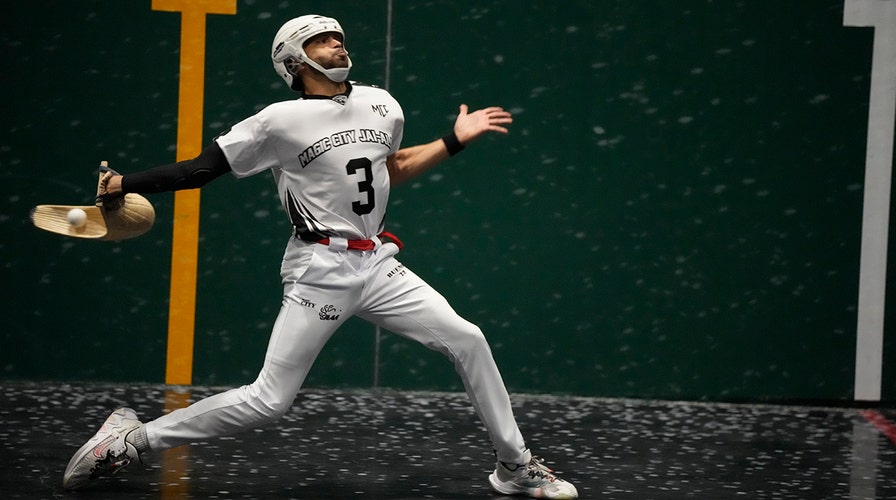Fox News Flash top headlines for March 27
Fox News Flash top headlines are here. Check out what's clicking on Foxnews.com.
The world’s fastest ball sport has been dying a slow death for decades.
Now, a group of committed enthusiasts is doing all it can to save jai alai, a game that originated in the Basque region of Spain and France but took root in Miami during the go-go days of the 1970s and '80s.
What could be jai alai’s curtain call is playing out at Magic City Casino, the last place the game is played as a professional sport. Gone are the celebrities like Paul Newman and John Travolta who used to crowd into sweaty, smoke-filled grandstands on a Saturday night to watch elite athletes fling a goatskin ball called a pelota in a three-walled fronton, or court, at 130 mph (210 km/h).
Instead, just a few dozen family members and die-hard fans turned out for a recent match. Live wagering, which long drove the sport, has dried up in the era of YouTube and online gambling. And many of the game’s top players who used to make the journey across the Atlantic have hung up their wicker cestas — curved baskets for catching and throwing — leaving a void that a roster of local, homegrown talent is hard-pressed to fill.
CLICK HERE FOR MORE SPORTS COVERAGE ON FOXNEWS.COM

Chris Bueno returns a ball in a Jai Alai match at the Magic City Casino fronton, Sunday, March 13, 2022, in Miami. (AP Photo/Rebecca Blackwell)
But the one advantage of having fallen so far is that the only direction left to go is up.
"We’re pretty confident there’s a future," said Scott Savin, the chief operating officer of Magic City. "At least there’s a present, so that means we have a fighting chance at a future."
The fate of the sport depends on the shoulders — and overextended rotator cuffs — of Magic City’s roster of 28 athletes. Seven of them — from Spain, France and the Philippines — were hired after nearby Dania Beach Casino’s fronton ended its seven-decade run last year.
One of the foreign players, Inaki Goitiandia, took up the sport at age 10. Jai alai was a favorite pastime growing up in the small town of Markina-Xemein in northern Spain. But as an adult, he and his brother Julen followed their father and grandfather’s footsteps to Miami, which for decades was a magnet for the game’s top talent.
"This is the only place where you can make a living playing jai alai," Goitiandia said, wiping his brow after winning an exhausting round-robin doubles match.
The remaining players are former high school and college athletes who learned the game as adults and still struggle with basics like catching the ball.
Tanard Davis, who was signed by the Indianapolis Colts after playing football at University of Miami, saw his NFL career fizzle and moved to Atlanta to pursue a career in law enforcement. In 2018, he was among the Hurricanes alumni who answered an email blast looking for volunteers from Magic City’s owners, the Havenick family, who are also major donors to UM athletics.
Davis is grateful for the opportunity to put on a uniform and get the adrenaline flowing again.
"It’s like a high school basketball player facing off against Lebron James," said Davis, who at 39 is one of the oldest but most physically fit players. "I don’t stand a chance in the long run, but I want to play as hard as I can."
To speed up the sport, Magic City has reduced the traditional fronton by nearly 60 feet (18 meters) and replaced the goatskin ball — as hard as a hockey puck — with a bouncier pelota that ricochets against plexiglass instead of the traditional granite wall. Magic City is also experimenting with the rules, creating so-called Battle Court matches resembling head-to-head singles tennis.
The goal is to reach younger, online bettors for whom win-place-show wagering is a bygone era. Content deals on free, advertising-supported platforms means games are reaching a potential audience of 115 million households and Magic City has teamed with platform BetRivers for online betting in seven states.
Want your own sports franchise? Sponsoring a team with catchy names like the Wall Warriors and Cesta Cyclones costs $100,000 — a bargain, Savin said, for a niche sport whose natural fan base is somewhere between the WNBA and Canadian football.
"It’s crawl, walk, run — but I think we got past crawl," he said.
The first jai alai fronton in the U.S. was built in St. Louis, for the 1904 World’s Fair, and in its heyday the game was played in several states. But it was always strongest in Florida, where pari-mutuel betting on horse racing, greyhounds and jai alai has been legal since the 1930s, and especially Miami.
Its long decline began in the 1980s, when Florida authorized the lottery. A players’ strike lasting more than two years followed. And competition from federally protected Indian reservations has taken a toll.
In what appeared to be the death knell for the game, Gov. Ron DeSantis signed a deal last year giving the Seminole tribe, which already runs the state’s biggest casinos, a monopoly over online sports betting. To level the playing field, casinos are no longer required to carry costly pari-mutuel sports in exchange for being allowed to offer slot machines and poker.
Benny Bueno, a former jai alai player who oversees player operations at Dania Beach, attributes the decline to the sport’s antiquated betting model, with casinos relying on live audiences to drive profits.
He hopes jai alai can make a comeback on simpler, if less lucrative, grounds. Less than a year after hosting its final regulation game, Dania Beach will hold a 10-day exhibition tournament next month that he hopes will revive a full-fledged season there in time for the fronton’s 70th anniversary in December.
Bueno said the outpouring of support from fans saddened to see part of South Florida’s rich history die pushed the casino’s owners to give it another try.
Meanwhile, Bueno’s son is doing his best to keep the game alive at Magic City. Chris Bueno pursued sports like baseball and basketball as a kid and only tried his hand at jai alai at the age of 27, while working as a supervisor at UPS.
"Like my dad always says: Everyone loves jai alai — some people just don’t know it yet," the younger Bueno said.









































